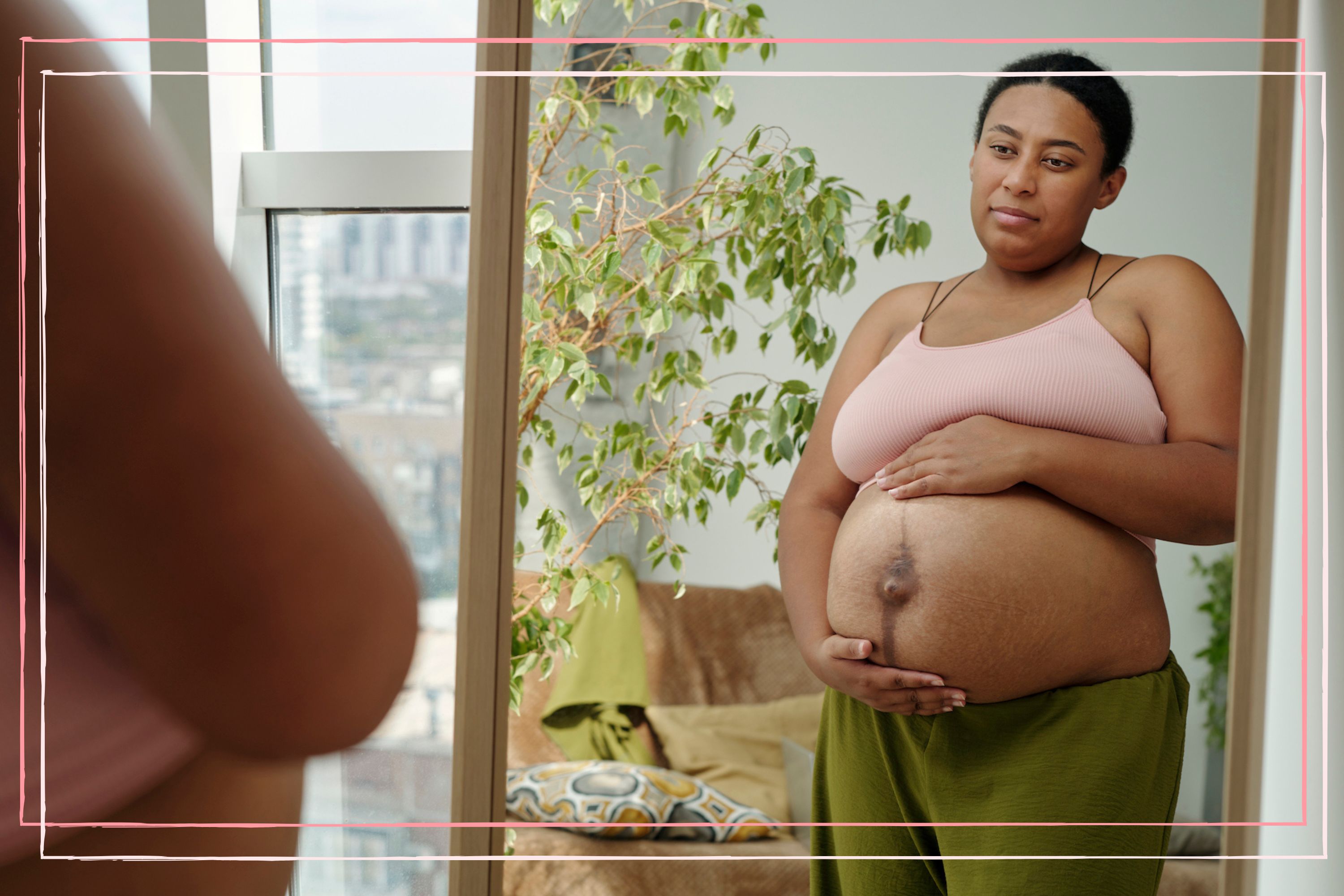8 unexpected ways your body changes in pregnancy
Mood swings and morning sickness are just the beginning – there’s also leaking breasts, bleeding gums and food aversions to potentially content with in pregnancy


Parenting advice, hot topics, best buys and family finance tips delivered straight to your inbox.
You are now subscribed
Your newsletter sign-up was successful
Pregnancy involves so much more than the changes that occur inside your uterus. Indeed, it’s a full-body process that affects every system in your body during those nine transformative months.
Of course, we’re generally familiar with the common early signs of pregnancy, such as food cravings, mood swings and morning sickness – but there are some other changes you might not expect. From changes to your oral health (hello, bleeding gums and a metallic taste) to leaking breasts (yes, even before the baby arrives), we’ve outlined eight unexpected ways your body changes during pregnancy – highlighting what’s normal and when to seek medical advice.
Unexpected body changes in pregnancy
1. Leaking breasts
You’ve probably prepared yourself to experience leaky breasts after you’ve given birth and your milk supply comes in – but did you know that leaking may occur before the baby arrives, too?
“Some people do leak in pregnancy, even as early as the second trimester,” says Emma Pickett, lactation consultant and presenter of the Makes Milk podcast. “They might notice yellow staining on their bra, or see yellow crystals or obvious signs of milk on the nipple.”
At this stage, the leaking substance is what’s known as colostrum, a nutrient-rich fluid that precedes raw milk.
Although it can be tempting, her advice is clear: “Don’t try and squeeze it out until you get to 36 weeks.” After this, official guidance says it is safe to hand express colostrum.
Some may find this beneficial. “It’s a good way to practise hand expressing,” Emma says. “It can also be useful to take a bit of colostrum into the hospital with you, just in case baby needs a bit of extra help [with feeding after birth].”
Parenting advice, hot topics, best buys and family finance tips delivered straight to your inbox.
2. Bleeding gums
Our changing hormone levels in pregnancy affect a lot of things, and our gums can be one of them thanks to increased levels of progesterone.
“These changing hormone levels make a pregnant person more vulnerable to the effects of the bacteria that cause gum disease,” says Saima Rennie, a dentist with over 25 years’ experience in the NHS and private sector. “It can sometimes also be related to lack of proper dental hygiene due to nausea.”
Bleeding gums is a common occurrence in pregnancy, and it can often carry on through breastfeeding too. It isn’t usually anything to worry about so long as you continue to take good care of your teeth. “Maintain excellent oral hygiene, including interdental cleaning as well as tooth brushing,” Saima advises.
She adds: “Also eat a well balanced diet with plenty of fruit and veg to ensure you get all the necessary vitamins and minerals [for good dental hygiene].”
3. Heightened sense of smell
Also known as hypersomnia, this surprising pregnancy symptom happens during approximately two out of every three pregnancies, usually in the first trimester.
This is mainly caused by the changing hormone levels experienced during pregnancy and is entirely normal, says Dr Aarthi Sinha, a GP from Church Crescent Medical.
However, she advises seeking advice if you experience extreme hypersomnia that affects your eating habits. “I've seen women in my clinic where the smells are so extreme that it stops them from eating or drinking adequately,” she shares.
“That’s when I'd advise to see your GP, a healthcare professional, an obstetrician or a midwife – especially if it means you're excluding certain food groups, such as avoiding meat – an important source of protein – because you suddenly find you don’t like the smell.”
4. A metallic taste in your mouth
Medically known as dysgeusia, a metallic taste in your mouth is another unexpected effect of pregnancy. This is also typically caused by the surge in pregnancy hormones – but not always.
“Occasionally it can be associated with a deficiency, particularly of iron,” shares Dr Sinha. This would normally show-up on routine blood checks during pregnancy, but if you’re experiencing dysgeusia she advises speaking with your GP.
Reflux – where stomach acid travels up to your throat from your stomach – can also contribute to a metallic taste in the mouth. “This is common in pregnancy, again because of hormone changes and the growing pressure the baby places on your stomach as the pregnancy progresses,” says Dr Sinha.
5. Thicker hair
It sounds too good to be true, but many pregnant women report their hair looking and feeling thicker than usual during pregnancy. So what’s going on – and will your newly plentiful mane stick around postpartum?
An increase in the hormone oestrogen is once again behind this unexpected pregnancy symptom. In this instance, it slows down the natural shedding cycle of our hair, as Pip Davies, a practising midwife and the founder of Midwife Pip, explains.
“The hormonal changes that take place in pregnancy mean that you don't lose hair in the same way as you do normally. We usually shed hundreds of hairs every day, but in pregnancy that doesn't happen.”
But enjoy that full-looking barnet while you can, because once oestrogen levels drop off postnatally, most women lose the extra hairs that weren’t shed as normal during pregnancy.
“This isn’t true hair loss, because they were hairs you were going to lose anyway,” says Pip. And whilst it can feel quite drastic, you can rest assured that it’s normal.
6. Increase in vaginal discharge
“It’s normal to experience a significant increase in vaginal discharge during pregnancy,” confirms Dr Sinha. It helps protect the baby by preventing infection travelling from the vagina to the womb. Colour-wise, this discharge should appear clear or slightly milky in colour.
However, discharge that has an offensive smell, or has either a green, brown or blood-like colour may indicate infection. Meanwhile, discharge that’s very watery could be a sign of amniotic fluid leaking. In either case, Dr Sinha advises seeking medical help.
7. Enlarged vulva
Midwife Pip highlights an enlarged vulva as something that can sometimes spark alarm amongst the mums-to-be that she words with. However, she assures that this is another normal bodily change during pregnancy and nothing to worry about.
“It’s linked to increased blood volume [the body produces up to 50% more blood during pregnancy], which can make the labia majora feel larger than pre-pregnancy,” she says, adding: “Typically it goes back down after giving birth.”
8. Food aversions
We all know about food cravings in pregnancy, but food aversion is also a common phenomenon that is experienced by almost one in seven pregnant women, according to research. “Usually this is just due to pregnancy hormones, but there can be medical reasons for food aversions too,” advises Dr Sinha.
Examples include pre-existing medical issues, such as reflux or gastritis, which may worsen in pregnancy. Food aversions may also be related to morning sickness, too.
If you’re unsure, it’s best to check with your GP. “I always tell my patients to come in and get checked when they experience more than a mild case of food aversion, just to make sure that there's nothing underlying going on like a thyroid problem or an underlying infection,” Dr Sinha says.
The information on GoodTo.com does not constitute medical or other health advice or diagnosis and should not be used as such. Although GoodtoKnow consults a range of medical experts to create and fact-check content, this information is for general purposes only and does not take the place of medical advice. Always seek the guidance of a qualified health professional or seek urgent medical attention if needed.
Experts in this article:

Emma Pickett IBCLC is a certified lactation consultant, author and podcaster who has provided breastfeeding support to hundreds of women. She qualified with the International Board of Lactation Consultant Examiners in 2011 and received the Lactation Consultants of Great Britain award for outstanding contribution to breastfeeding in 2022. In addition to working with private clients, Emma volunteers at local breastfeeding support groups, the national Breastfeeding Helpline and the Association of Breastfeeding Mothers helpline. She also presents the Makes Milk podcast and is the author of four books about breastfeeding, including You’ve Got It In You: A Positive Guide to Breastfeeding.

Saima is a dentist with over 25 years’ experience in both the NHS and private sector. She gained her dentistry degree from the University of Glasgow, and went on to become first partner and then owner of a successful dental practice in Lincolnshire.

Dr Aarthi has been practising as a GP since 2014, mostly as a senior partner in practice. She completed her medical training at Guy’s and St Thomas’ Hospital Trust, part of King’s College London. She undertook further medical experience around the UK before settling in North London, where she completed my GP training. It is here that she set up her own practice, Church Crescent Medical. In addition to her medical degree, she also has a Bachelor's degree in Radiological Sciences and several diplomas in gynaecology, sexual health and occupational medicine.

Pip currently works as a delivery suite sister and a specialist pelvic health midwife, and also offers pregnancy and postnatal support services via her Midwife Pip platform. Her qualifications include a first class BSc in Midwifery and a KGH Hypnobirthing Diploma. She also holds a pre and postnatal exercise qualification and is a certified Mummy MOT practitioner. She is the author of Midwife Pip’s Guide to a Positive Birth (£16.99, Amazon) and the host of The Midwife Pip Podcast, where she discusses all things pregnancy and postpartum.

Stephanie is former Acting Editor and Content Director at GoodToKnow. She is also mum to son Woody (don't worry, they don't share a surname!), who was born in November 2021. As a journalist, Stephanie has over 17 years' of experience, and has worked as a digital editor and writer for brands including Stylist, Fit&Well, MSN and Woman&Home.